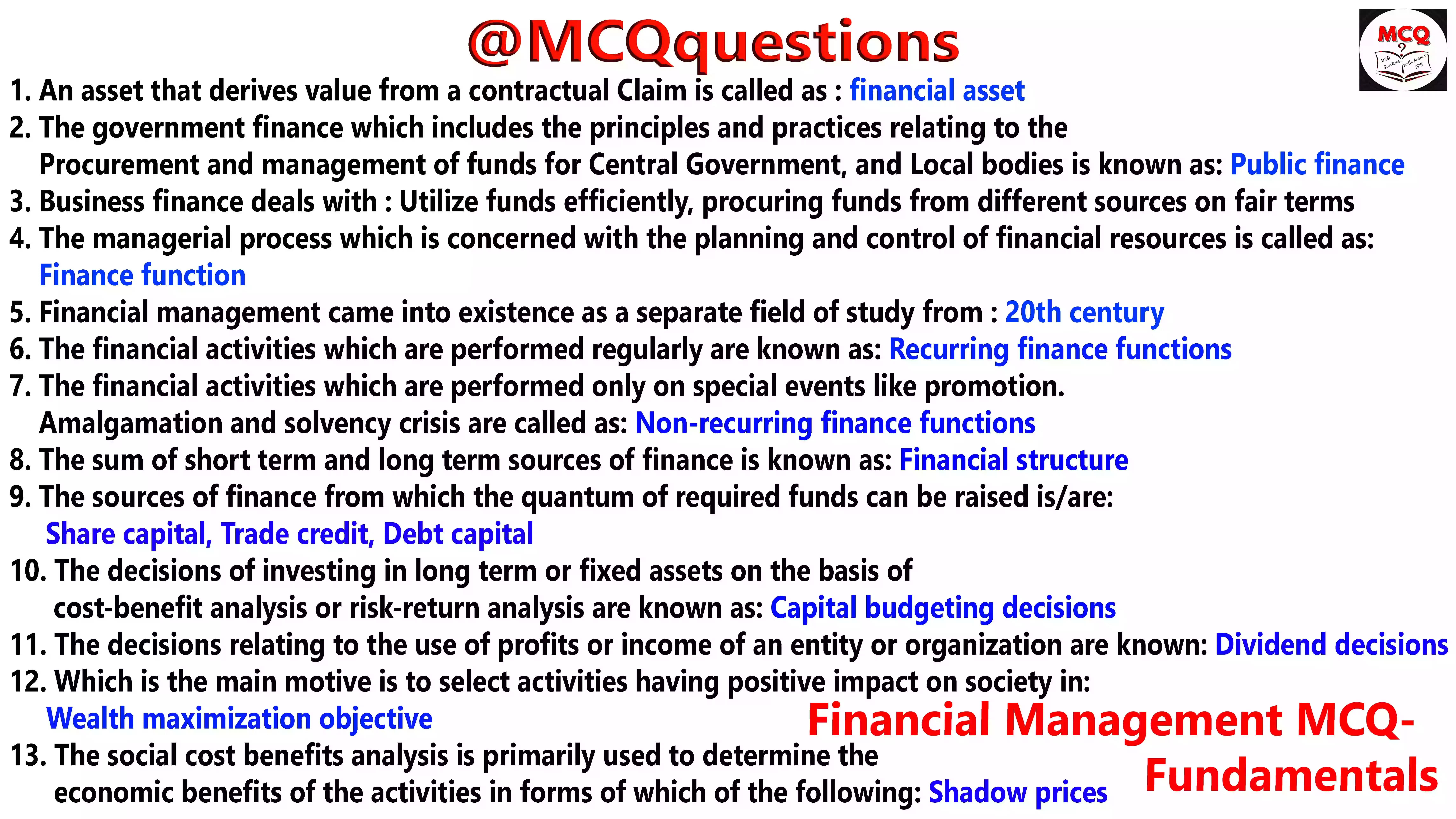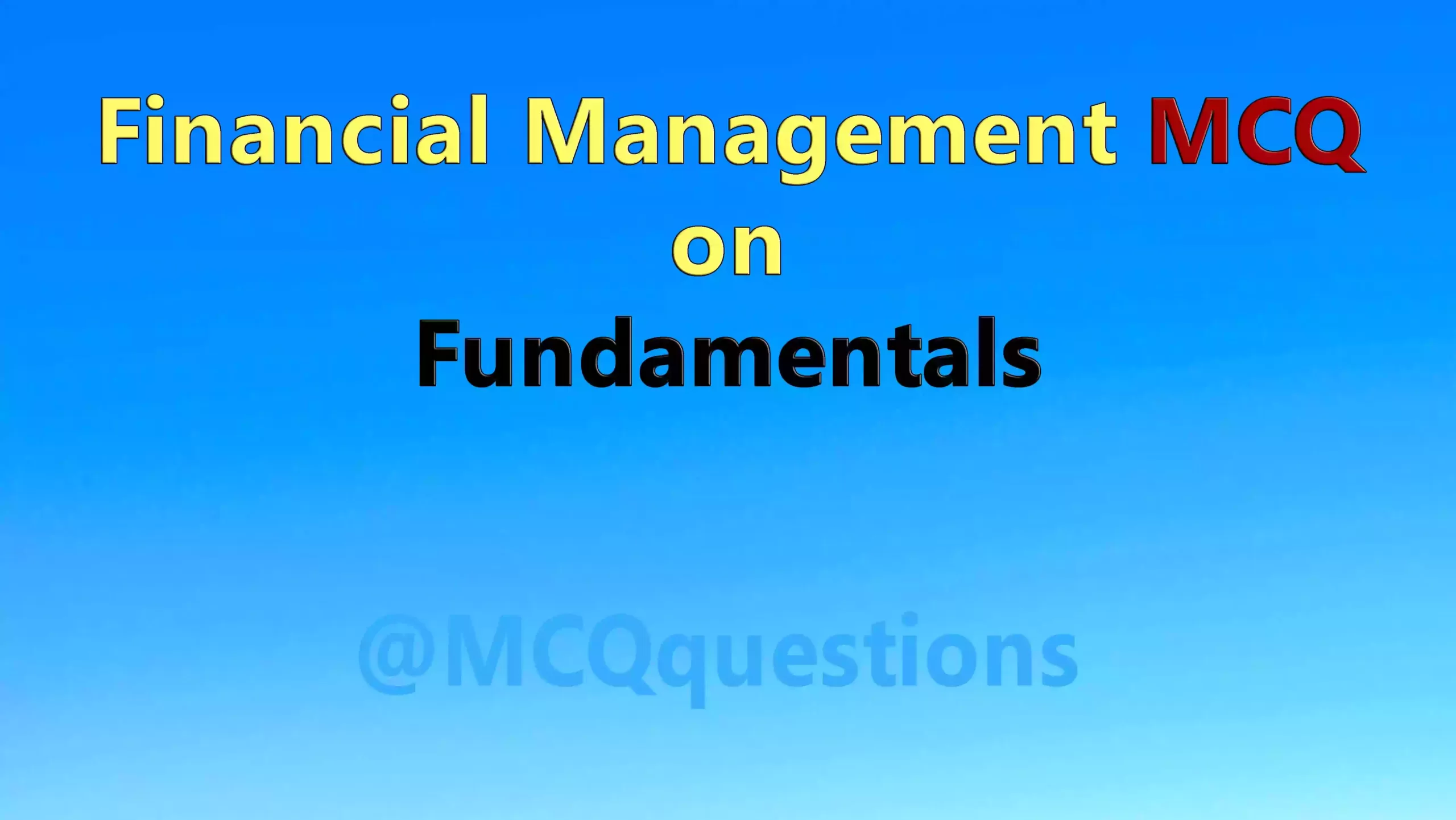Financial Management MCQs

Financial Management MCQ on Fundamentals
1. Funds are financial resources in the form of:
(a) Corporate capital
(b) Business funds
(c) Cash Equivalents
(d) All of these
Ans- (d) All of these
2. An asset that derives value from a contractual Claim is called as
(a) Fictitious asset
(b) Financial asset
(c)Tangible asset
(d) Real asset
Ans-(b) Financial asset
3. The government finance which includs the principles and practices relating to the Procurement and management of funds for Central Government, and Local bodies is known as:
(a) Public finance
(b) Business Finance
(c)Private Finance
(d)All of these
Ans- (a) Public finance
4. Business finance deals with which of the following?
(a) Utilize funds efficiently
(b) Procuring funds from different sources on fair terms
(c) Both of these
(d) None of these
Ans- (c) Both of these
5. The managerial process which is concerned with the planning and control of financial resources is called as:
(a) Control function
(b) Finance function
(c) Management function
(d) None of these
Ans-(b) Finance function
6. Financial management came into existence as a separate field of study from…?
(a) 19th century
(b) 21st century
(c) 20th century
(d) None of these
Ans-(c) 20th century
7. The financial activities which are performed regularly are known as:
(a) Non-recurring finance functions
(b) Both of these
(c) Recurring finance functions
(d) None of these
Ans-(c) Recurring finance functions
8. The financial activities which are performed only on special events like promotion. Amalgamation and solvency crisis are called as:
(a) Non-recurring finance functions
(b) Recurring finance functions
(c) Both of these
(d)None of these
Ans-(a) Non-recurring finance functions
9. The sum of short term and long term sources of finance is known as:
(a) Capital structure
(b) Both of these
(c) Financial structure
(d) None of these
Ans-(c) Financial structure
10.The sources of finance from which the quantum of required funds can be raised is/are:
(a) Share capital
(b) Trade credit
(c) Debt capital
(d) All of these
Ans-(d) All of these
11. The decisions of investing in long term or fixed assets on the basis of cost-benefit analysis or risk-return analysis are known as:
(a) Working capital decisions
(b) Financial Decisions
(c) Capital budgeting decisions
(d) None of these
Ans-(c) Capital budgeting decisions
12. Short term or current assets Decisions are known as:
(a) Short term investment decisions
(b) Working capital decisions
(c) Both
(d) None
Ans-(c) Both
13. The decisions relating to the use of profits or income of an entity or organization are known
(a) Finance decisions
(b) Dividend decisions
(c) Investment Decision
(d) Any of these
Ans-(b) Dividend decisions
14. The profits or income of an entity or organisation can be used:
(a) To distribute it as dividend to the shareholders
(b) To retain it in business in the form of accumulated profits
(c) Either a or b
(d) None of these
Ans-(c) Either a or b
15. The financial manager selects one or more sources of finance after proper taking into
Consideration of:
(a) Cost of capital
(b) Control
(c) Risk
(d) All of these
Ans-(d) All of these
16. The financial objectives in terms of decision criteria may be:
(a) Welfare maximization
(b) Wealth maximization
(c) Profit maximization
(d) Any of these
Ans-(d) Any of these
17. The profit maximization objective has been criticized on the basis of:
(a) Ignore risk factor
(b) Ignore time value of money
(c) Ambiguity
(d) All of these
Ans-(d) All of these
18. Which is the main motive is to select activities having positive impact on society in:
(a) Profit maximization objective
(b) Welfare maximization objective
(c) Wealth maximization objective
(d) None of these
Ans-(c) Wealth maximization objective
19. The social cost benefits analysis is primarily used to determine the economic benefits of the activities in forms of which of the following:
(a) Market prices
(b) Discounted prices
(c) Shadow prices
(d) Augmented prices
Ans-(c) Shadow prices
20. Treasurer performs the functions of which of the following functions:
(a) Credit management
(b) Cash management
(c) Procurement of essential funds
(d) All of these
Ans-(d) All of these
21. Financial controller is responsible
(a) Cash management
(b) Credit management
(c) Securities management
(d) None of these
Ans-(d) None of these
Also Read Financial Management MCQ
